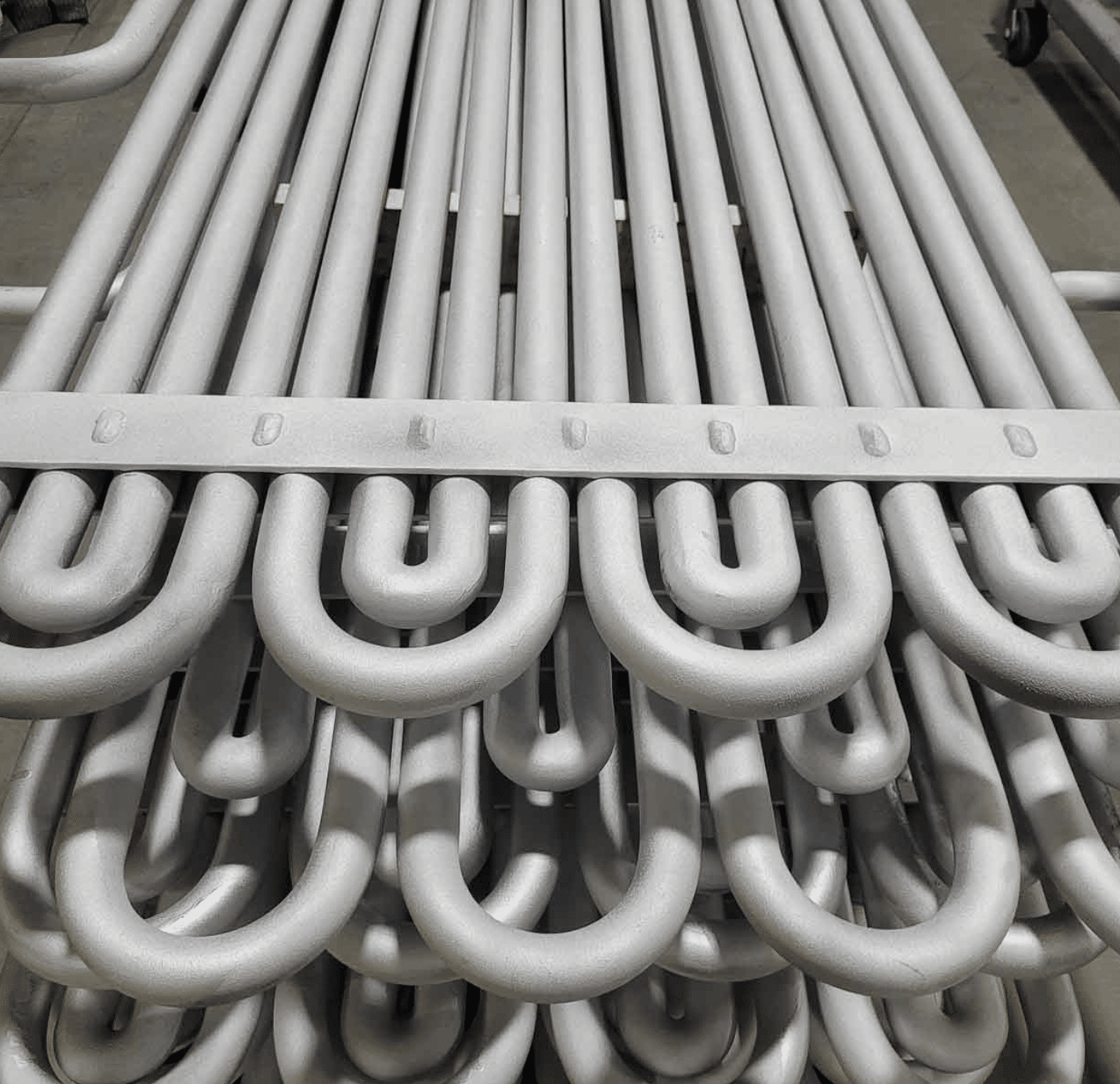Thermal Spray Boiler Tube Cladding – IGS Shop Work Service
A reliable boiler tube shop work cladding service near you
IGS is recognized worldwide for its proprietary High Velocity Thermal Spray (HVTS®) alloy cladding. Our boiler tube cladding service is available to power plants across the United States to prevent corrosion and erosion and extend the useful operating life of your boilers.
Fit-for-Service Boiler Tubes in 3 Easy Steps…
- Send your boiler tubes to our workshop in Richmond, Virginia, or we can apply the cladding at a third-party workshop or on-site at your facility.
- IGS technicians apply High Velocity Thermal Spray (HVTS®) in accordance with the pre-agreed scope.
- IGS ships your boiler components back to your facility. The whole process is usually completed within two weeks.

Corrosion Resistant Super Alloys

Service Boiler Tubes

Trusted and Approved HVTS Cladding

Fast Application and Delivery
Corrosion Mechanisms in WtE and Biomass CFB fired Boilers
CFB boilers are preferred for their high efficiency and flexibility in fuel usage, thus high pressures and temperatures are found within these units. The more corrosive agents introduced through the fuel, the higher corrosion will develop on the non-protected heat exchange steel surfaces of the super-heaters.
Most corrosion protection mechanisms consist of generating a corrosion barrier on the base metal by forming an oxide layer. Inside CFB boilers this layer is quickly eroded, forcing the formation of another layer and consequently leading to erosion-corrosion phenomenon. Erosion-corrosion thinning can be quick with soft or poor erosion resistance materials.
With such conditions it can be expected that ashes will not build up so less corrosion by salts occurs. This is true for the surfaces seeing high flow speed, but in some areas the ashes can build up and typical under ash salt corrosion can develop due to flow turbulence.
Even without an ongoing erosion mechanism, salt corrosion will depend on ash composition and tube skin temperature. With materials softening with temperature, erosion resistance performance of most materials declines and is something that must be addressed in CFBs and WtE units.
(Picture, left: an example of CFB Boiler erosion)

Hot Molten Salt Corrosion of WTE Boilers
The hot molten salt corrosion process starts when the temperature of the tube surface is higher than the melting point of the precipitated salts so that salt melts directly on to the metal surface. The resulting reaction dissolves existing oxide layers, which let the corrosive chlorine gas dissipate to the metal surface.
Hot salt melts also change the structure of the fouling from a porous structure to a dense cover, trapping the iron chloride and closing it off from the gaseous oxygen thus increasing chlorine corrosion. Pitting is an even more dangerous mechanism of the molten salts reacting as a liquid electrolyte directly with the steel and dissipating it. If the equipment is not protected, costs and lost time can rapidly accumulate when something goes wrong.
Dew-Point Corrosion in WtE and Biomass Boilers
When the temperature of the flue gas decreases, a specific gaseous species reach saturation, droplets of the liquid start to condense on solid surfaces. The saturation temperature depends on the load of the concerned species and, for sulfuric acid, on the humidity of the flue gas.
The liquid electrolytes forms wet spots on the surfaces, causing general corrosion and material loss in the form of pitting. In waste-to-energy plants, dew point corrosion is less common than in coal-fired plants, because SO3 reacts with chlorine species, making the formation of sulfuric acid less likely.
SMART Gard – The Smarter Way to Guarantee CFB Boiler Reliability
Find out more about SMART Gard solution characteristics, alloy features, technological benefits, erosion resistance, and much more.
Hot Molten Salt Corrosion of WTE Boilers
The hot molten salt corrosion process starts when the temperature of the tube surface is higher than the melting point of the precipitated salts so that salt melts directly on to the metal surface. The resulting reaction dissolves existing oxide layers, which let the corrosive chlorine gas dissipate to the metal surface.
Hot salt melts also change the structure of the fouling from a porous structure to a dense cover, trapping the iron chloride and closing it off from the gaseous oxygen thus increasing chlorine corrosion. Pitting is an even more dangerous mechanism of the molten salts reacting as a liquid electrolyte directly with the steel and dissipating it. If the equipment is not protected, costs and lost time can rapidly accumulate when something goes wrong.
Dew-Point Corrosion in WtE and Biomass Boilers
When the temperature of the flue gas decreases, a specific gaseous species reach saturation, droplets of the liquid start to condense on solid surfaces. The saturation temperature depends on the load of the concerned species and, for sulfuric acid, on the humidity of the flue gas.
The liquid electrolytes forms wet spots on the surfaces, causing general corrosion and material loss in the form of pitting. In waste-to-energy plants, dew point corrosion is less common than in coal-fired plants, because SO3 reacts with chlorine species, making the formation of sulfuric acid less likely.

I’m here to help
Colin Bateman
IGS Subject Matter Expert
WATCH: Urgent CFB Waterwall Repair Saves Client from Severe Penalty
William Nixon, IGS Field Operations Director, discusses an urgent case where IGS were required to act fast to help a client get a key asset back online.
The Circulating Fluidized Bed (CFB) Boiler went down on a Friday and the client was liable for a severe penalty if the asset was not back online quickly and within a specific timeframe. Thanks to fast mobilization, IGS were able to apply High Velocity Thermal Coating (HVTS®) and help get the CFB boiler back online within four days.
Free consultation with an IGS Subject Matter Expert
Leave us a note or start a chat with our operator to learn more about what we offer in corrosion and erosion prevention in WtE and Biomass circulating fluidized bed boilers.
